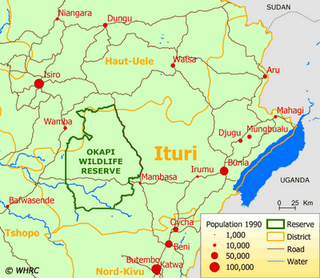
Last week's announcement of the final results from the presidential elections were met with widespread celebration here in the Eastern provinces. I was in Beni, a commercial center in the Grand Nord part of North Kivu province, and everyone went wild. Not so in the Western provinces, particularly in Kinshasa, where Bemba had the majority. "Awa tozo sepila, kuna na Kin bazo lela" was the assessment of one smiling man here. (Here we're celebrating, there they're crying). Kabila won with 58.3% percent of the vote; turnout was pretty poor but I dont have the exact figure.
Bemba, the loser, claims he will contest the elections through legal process, which remains to be seen. Kinshasa is still tense, but no acts of violence since the announcement have been reported.
Here in Ituri it is relatively calm, although populations continue to be displaced in clashes between FARDC (govt army) and local militia groups. As the wider Congolese context is pacified, Ituri no longer qualifies as a 'war within a war', as was long the case. Kabila's election is likely to have a positive effect on the disarmament negotiations with local militia leaders, currently underway. Three leaders of different groups "want to be generals in Kabila's army" (they probably didnt vote Bemba!), and this may provide the carrot that should string them down the path of pacification. They are also demanding amnesty from ICC indictment, which remains to be seen. DRC government negotiators are in the area now meeting with the three leaders, something that has never been able to transpire in the past.
Kinshasa voted in favor of Bemba, from Equateur province north of Kinshasa, claiming he's the "son of the soil" (mwana mboka) -- not Kabila, who they argue is really a Rwandan, nor does he speak Lingala. The two candidates represent the two major cultures (east and west) defining and dividing the national psyche. The electoral contest has strained the limits of their compatibility: between east and west, that is.
Perhaps this grievance will abate with time, particularly if Kabila actually does something to improve the lot of the country, which wouldn’t be hard since its lows have never been lower. Political will to do so has been absent in this country for 40 years. For reasons I find incredibly myopic, people in Kinshasa think that whoever runs the country has to speak lingala and hail from Equateur, like Mobutu.
Very little time to blog or even breathe here but hope to catch up soon.
No comments:
Post a Comment